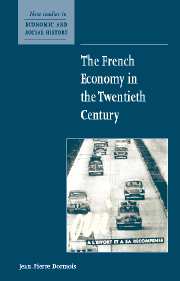Book contents
- Frontmatter
- Contents
- List of figures
- List of tables
- Preface
- List of acronyms
- 1 The end of French exceptionalism?
- 2 French economic performance in international perspective
- 3 France and the wider world
- 4 The changing face of Colbertism
- 5 The institutions of French capitalism
- 6 Labour: the French at work
- 7 Plough and pasture: lifeblood or drain?
- 8 Industrialisation, de-industrialisation, postindustrialisation
- Conclusion
- Glossary
- A national portrait gallery of twentieth-century France
- Bibliography
- Index
- Titles in the series
4 - The changing face of Colbertism
Published online by Cambridge University Press: 14 January 2010
- Frontmatter
- Contents
- List of figures
- List of tables
- Preface
- List of acronyms
- 1 The end of French exceptionalism?
- 2 French economic performance in international perspective
- 3 France and the wider world
- 4 The changing face of Colbertism
- 5 The institutions of French capitalism
- 6 Labour: the French at work
- 7 Plough and pasture: lifeblood or drain?
- 8 Industrialisation, de-industrialisation, postindustrialisation
- Conclusion
- Glossary
- A national portrait gallery of twentieth-century France
- Bibliography
- Index
- Titles in the series
Summary
It is a deeply ingrained belief among French experts and in public opinion at large that France possesses specific and superior political arrangements and that they are in any case best suited to the French character and Weltanschauung. This exception assigns a preeminent role to the state in directing economic life, expressed in the term dirigisme or volontarisme. A forceful tradition among the political elite, it is alleged to have been inspired by Jean-Baptiste Colbert (1619–83), minister to Louis XIV. In the golden age of mercantilism, Colbert conceived the country's material wellbeing as subservient to its politics and the grandeur of the king and the state. His ambition was for the state to brace its energies to this end, to build up the country's defence, to promote self-sufficiency and to pursue full employment, while maintaining standards of fairness and morality in the marketplace. He advocated government control of the balance of payments, but also direct intervention in economic life, and introduced extensive regulation in the labour and commodity markets with a view to promoting national champions and strategic industries. Colbert's ideas have left deep marks in the French psyche: the state embodies the common good, the organising force of society. Colbert's principles have largely inspired French government intervention throughout the twentieth century. How these authoritarian strands were integrated with the modern French republican tradition requires some preliminary explanation.
- Type
- Chapter
- Information
- The French Economy in the Twentieth Century , pp. 43 - 62Publisher: Cambridge University PressPrint publication year: 2004

